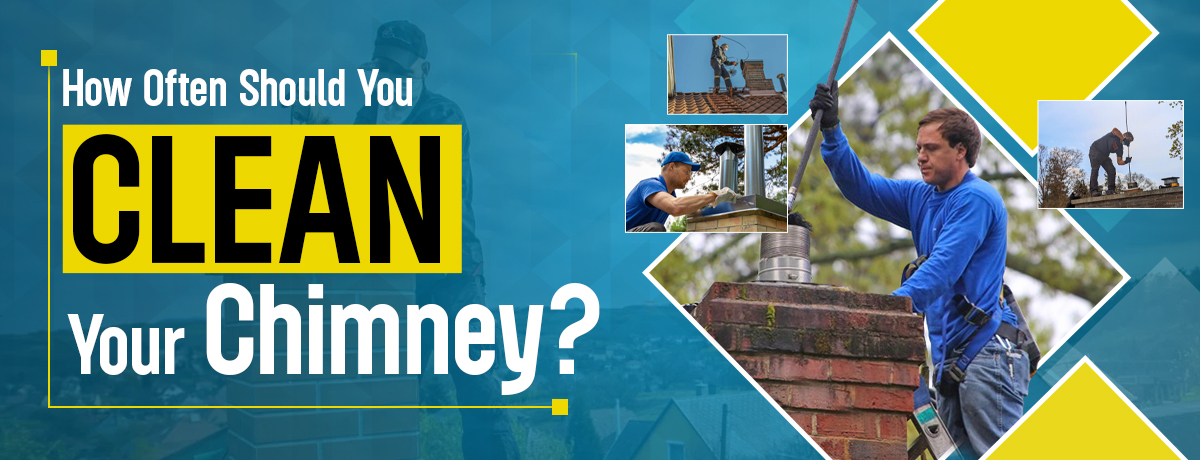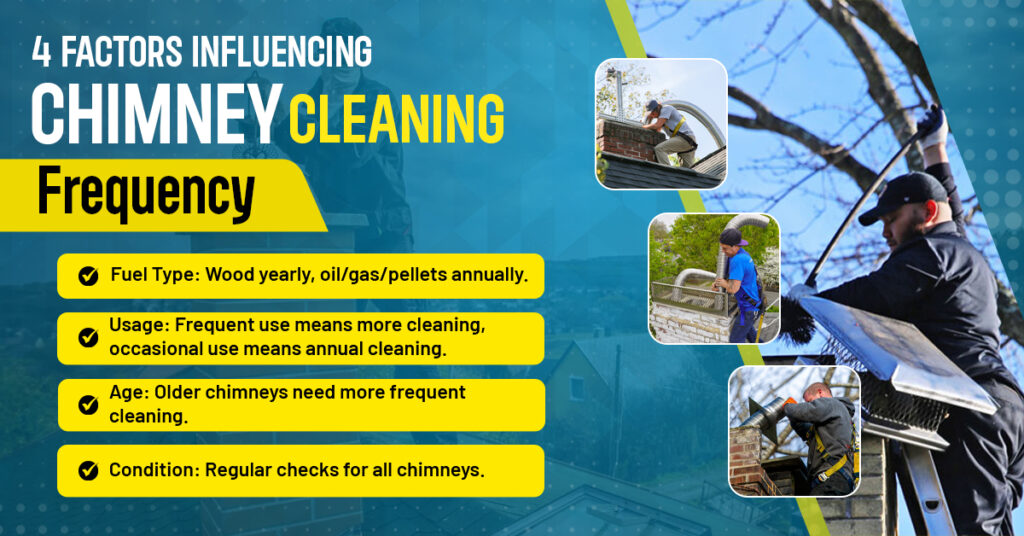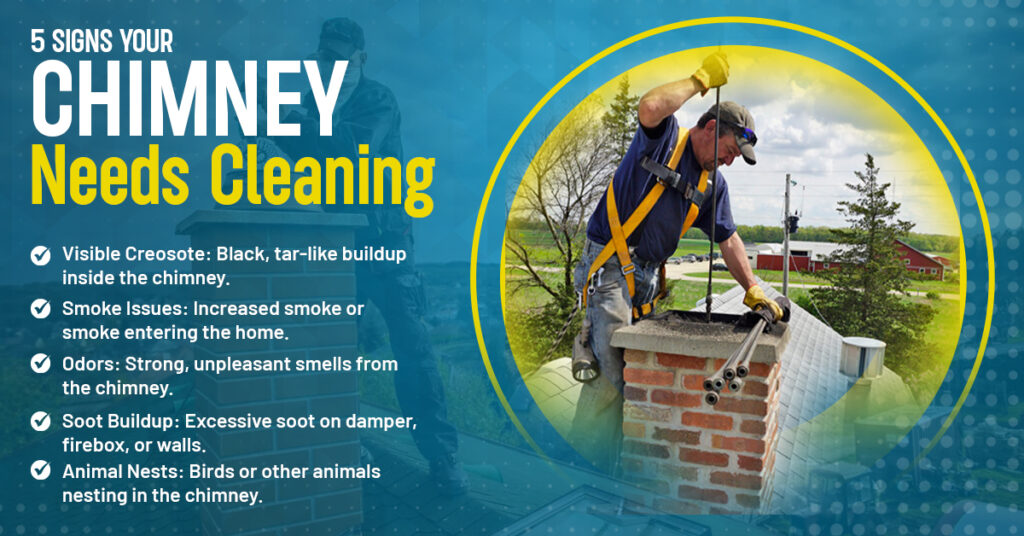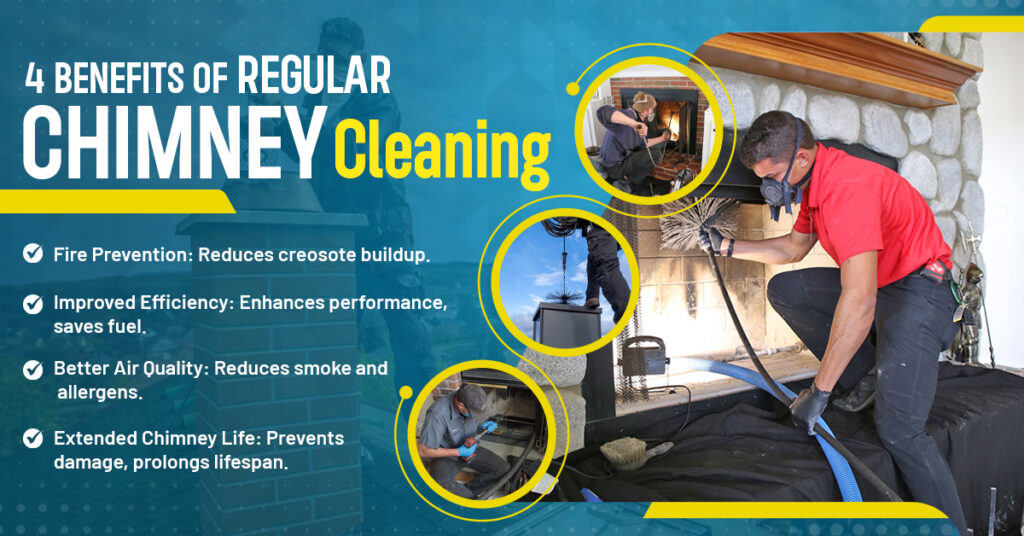
A well-maintained chimney is essential for the efficiency and safety of your home’s heating system. Regular cleaning improves air quality, helps prevent fires, and ensures that your fireplace or wood stove operates efficiently. But how often should you clean your chimney? Well, it depends on several factors, such as the fuel type you burn, how frequently you use your fireplace, and the age of your chimney. We’ll explore these factors in detail to help you determine the best cleaning schedule for your chimney.

The type of fuel you burn in your fireplace or wood stove significantly impacts how often you should clean your chimney.
Wood: When you burn wood, especially softwood, it produces a tar-like substance called creosote that can build up in your chimney over time. Creosote is highly flammable and is a leading cause of chimney fires. If you burn wood regularly, you should have your chimney cleaned at least once a year, ideally before the heating season begins.
Oil and Gas: Chimneys used for oil or gas heating systems produce less creosote than wood-burning systems, but they can still accumulate soot and other debris. We recommend inspecting and cleaning the chimneys annually to ensure they operate safely and efficiently.
Pellets: Pellet stoves are generally cleaner than wood-burning stoves but can still produce ash and soot. Annual cleaning can keep the system running smoothly.
How often do you use your fireplace or stove? Your usage frequency also affects the cleaning schedule.
Frequently: If you use your fireplace or wood stove frequently throughout the winter, you may need to clean your chimney more than once a year. A mid-season inspection and cleaning can help ensure your chimney is safe and efficient.
Occasionally: For those who use their fireplace or stove occasionally, an annual inspection and cleaning should suffice. However, if you notice any changes in how your fireplace operates, such as difficulty starting a fire or increased smoke, it may be time for a cleaning.
Older chimneys may require more frequent cleaning and maintenance.
Older Chimneys: If your chimney is 20 years old or older, it may have accumulated significant creosote and debris. Regular cleaning and inspections are crucial to prevent potential hazards.
Newer Chimneys: Newer chimneys are typically designed to be more efficient and produce less creosote. However, they still require regular cleaning to ensure they operate safely.
Even with a regular cleaning schedule, it’s important to be aware of signs that your chimney may need additional attention. These include:

Visible Creosote: If you can see black, tar-like creosote buildup inside your chimney, it’s time for a cleaning.
Smoke Issues: If your fireplace or stove produces more smoke than usual or if smoke enters your home, your chimney may be blocked and need cleaning.
Odors: A strong, unpleasant odor coming from your chimney is often a sign of creosote buildup.
Soot Buildup: Excessive soot on the damper, firebox, or chimney walls indicates that a cleaning is necessary.
Animal Nests: Birds and other animals sometimes build nests in chimneys, which can block airflow and pose a fire hazard. Regular inspections can help identify and remove these obstructions.
While some homeowners may be tempted to clean their chimneys, hiring a professional sweep is highly recommended. Professional chimney sweeps have the training and equipment to clean your chimney thoroughly and identify potential issues. They can also perform inspections to ensure your chimney is in good condition and meets safety standards.

In summary, the frequency of chimney cleaning depends on the type of fuel you burn, how often you use your fireplace, and the age of your chimney. Wood-burning chimneys typically need cleaning at least once a year, while oil, gas, and pellet systems can usually be cleaned annually. Always watch for signs that your chimney needs cleaning and consider hiring a professional sweep to ensure your system is safe and efficient. Hometown Air Duct offers professional chimney cleaning services in Texas, ensuring your chimney operates safely and efficiently all year round.